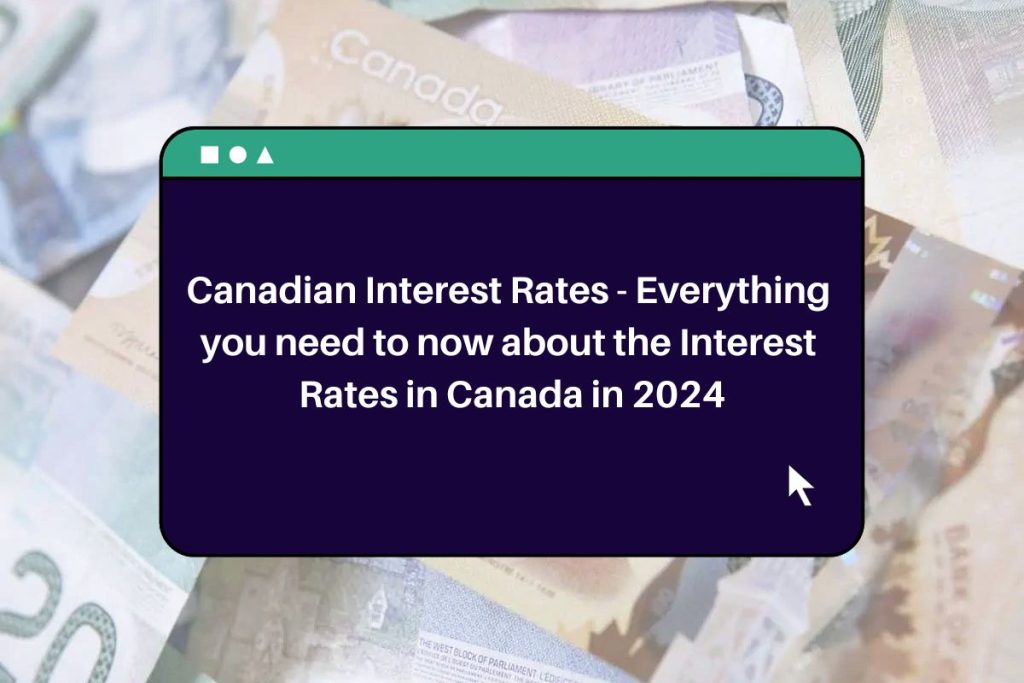Interest rates in Canada vary on different scales. According to the Bank of Canada, the current interest rate in Canada is 7.2%. So if you want to know all the aspects that affect a person for this inflation of interest rate increase then you have to read this entire article till the end.
Here I have provided everything related to Canadian interest rates, how high will Canadian interest rates go in 2024 and many other things that you should know well by reading the further sections. There are many pros and cons to interest rate increases in Canada. Some savings accounts have higher interest rates which one can avail by getting higher interest rates on their savings.
Canadian Interest Rates
Annually, the Bank of Canada revises the Canadian interest rate and provides measurement results on its website. If you want to know the updated interest rate in Canada then you can visit the official website and know the revision there. The interest rate can be applied to banking products like loans, finance and others. While returning the amount one has to pay interest on the applicable product.
For example, if a lender finds the borrower to be low risk then the borrower will be given lower interest, but if looking for high risk the borrower will need to be given higher interest rates accordingly. So it will depend on what type of product you buy and at what interest rate then the return amount will be made as per the applicable interest rate.
Interest Rate in Canada
As of now, the Bank of Canada is trying to keep the interest rate at a neutral level and the Canadian interest rate is expected to reach 4.5% in 2024. So if you are concerned about Canadian interest rate fluctuations then all you have to do is check the official website to get the official statement on this. Currently, this rate is 7.2% which affects personal daily life and also affects the working person.
Soon the Bank of Canada will revise its policies on interest rates and the rate may be negotiated. As we know, Canadian interest rates can depend on demand and supply in the market. If you want to know more about it then you can check out the sections given below.

How are Interest Rates Determined in Canada?
There are many factors responsible for Canadian interest rates. The Bank of Canada revises interest rates based on inflation, current market conditions and certain changes in policies. If you are also affected by this inflation then you should know about the interest rate in Canada and also set the goals of your life. Banks have different rates. The Bank of Canada sets commercial bank key rates through overnight rates. Most banks in Canada still have their prime rates but some of them are different from others.
Canada’s interest rates may see significant changes in the upcoming financial year. There is no fixed interest rate and it keeps fluctuating according to the market. Due to inflation, interest rates may be increased and the Bank of Canada will cut its overnight rate if inflation falls 1%. There are many factors when determining the interest rate you are receiving that may vary depending on the type of loan, such as car loan, home loan, mortgage, and many others. So those people who are getting lower interest rates will benefit from it. However the final function is done based on the rules and regulations provided by the government to all the banks and other financial firms in Canada.
Types of Interest Rates in Canada
- Fixed Rate of Interest: According to the Bank who decided further Fixed Interest Rate according to the debt taken by you. Generally, the interest rate has been decided at the time you sign an agreement and after that, there is no increment in the interest rate.
- Simple Interest: The Simple Interest will be calculated on your Principal amount and also it will depend on which interest rate you have signed in the agreement. There are no additional rates are included.
- Variable Rate of Interest: It will depend on the condition of the Market. If you borrow any from the Bank norms then it is observed that the rates are directly proportional to the fluctuation in the market condition. This is highly recommended for those individuals who are willing to risk according to the market condition.
- Compound Interest: In compound interest, your previous interest will be added to your principal amount, and then a new interest will be applied to the remaining amount and it keeps changing.
Prediction on How High Will Canadian Interest Rates Go in 2024
- The market is still estimating another 0.25% rate increase by the end of the year. Perch estimates the Bank of Canada will remain stable.
- Over the past month, economic data has been more suspicious and the market now expects rate cuts to begin in the second quarter of 2024.
- Long-term variable mortgage rates remain stable at 5%, which is roughly 1% below current market mortgage rates.
- This confirms that the market expects rates to remain high for a longer period, as our June prediction had projected an incremental rate cut of 2-2.5%.
- In 2024, it is expected that the Bank of Canada will cut rates by 2% and in 2025 by 1%.
- This would result in lower payments for adjustable-rate mortgage holders.
- We estimate the key interest rate to be around mid-4% in 2024 and mid-3% in 2025.
- TD economists estimate the policy rate could reach 2.25% by 2025 as inflation slows and economic growth declines.
| Official Portal | Click Here |
| Our Homepage | Matricbseb.com |
- About the Author
- My Recent Posts
